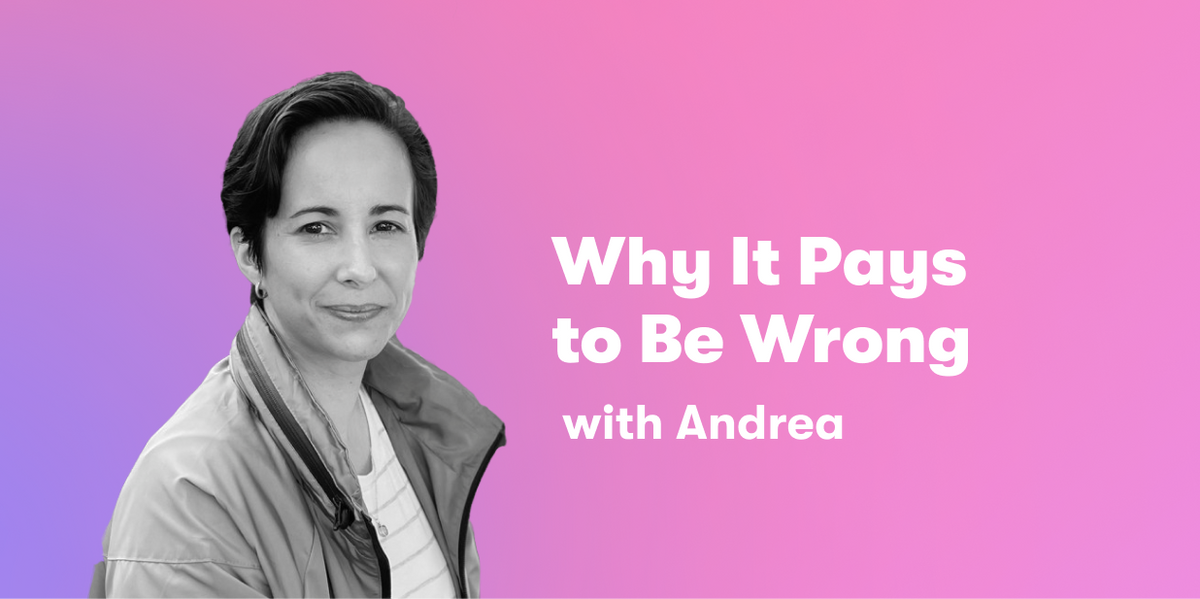Why It Pays to Be Wrong: An Interview with Senior PMM Andrea Saez

As Senior Product Marketing Manager at Trint, Andrea Saez is an expert on all things product and growth. Saez was recently named one of the Top 100 Product Marketing Influencers–and with good reason. Her blog on Medium has attracted thousands of readers who appreciate her passion for product thinking and the level of detail she puts into her informative articles.
Welcome to the Collato blog, Andrea! We’re so happy to have you here. Do you mind introducing yourself to our readers, and telling us a little bit about your background? How did you get into product management?
I started out in support. I was well into my support/success career when one day I asked a simple question: “Why?” This led my then-CEO to realize he was spending a ton of money on a project that wasn’t going anywhere, and no one else had dared question him but me (2 weeks into the job!). That same day, after shutting down the project, he turns to me and tells me I am product manager. I had no idea what that even meant! I had to learn on the job *very quickly.*
From then, I went on to work as part of the product team in various roles, from product experience to now product marketing. I have now found the career that I definitely enjoy and love - PMM (product marketing manager). I get to be both strategic next to the product team, do user research, etc, but also be creative with copy and content.
In your article, “What the H*ck Is a Product Manager Anyway,” you touch on good and bad product managers. How would you define the core competencies of a good PM when just starting out?
If you are just starting out as a PM, my advice would be to be aware that you might be wrong - and that is ok. We often treat being wrong as the worst thing that can happen, but that’s not true. Being wrong should be celebrated often, as this gives you the opportunity to learn, grow, and adapt. Being a PM isn’t about “bringing solutions to the table” - it’s about knowing how to identify problems worth solving.
Imposter syndrome, or the feeling of not being suitable enough for a position, is a common pain point in the PM industry. Why do you think imposter syndrome occurs so frequently in product management? And what can PMs do to overcome it?
I think this relates very well to what I just said about being wrong. We are so often told that being wrong is, well, wrong. But being wrong can be right - if anything, we should aim to disprove our hypotheses as much as we can until we can find the closest answer to the truth based on the evidence we are able to gather.
Product is a mix of art and science, and that can be really scary, especially when you’re in an atmosphere that lacks the psychological safety to learn from mistakes. Even more so when the decisions we make impact the business directly. Product is hard, and there’s a lot of pressure that comes from all angles as we try to build great products.
What are some common misconceptions about product managers and their job descriptions? Is there anything specific that people get totally wrong about the role?
My all time favorite (and by favorite, I mean the worst!) is “adapt to timelines” or “manage projects and deliver on time.” These are not things product managers do - what you’re looking for is a project manager. Product people focus on vision, strategy and value.
Yes, they still have to work with developers to release things, but there’s a whole product development process that happens from ideation to release, and there are several team members that lead steps within this process. You cannot expect a single person to handle it all. (Think PM, designers, developers, PMM - we all jump in at a different stage!)
You’ve written a few articles on the value of experimentation in PM. What recommendations would you give a product manager wanting to implement this strategy into their product schedule?
Knowing something is better than knowing nothing. Speak to customers as often as you can - there is always something to be learned. If you are getting feedback from leadership that there is “no time to do so” - position it like this: taking the time to learn can ease your decision-making and prevent the risk of business failure. You do not want to spend their time and money building the wrong thing!
Discovery and experimentation doesn’t have to last months and months. You can learn within a few weeks or even days. Experimentation can be done quickly, and that’s the important bit - it’s about including it as part of your agility to execute against your strategy. For the most part, leadership wants to see results, and discovery can aid in that. It ensures that the results you provide have a positive impact on the business.
How would you predict 2023 will shape product management? Do you foresee any significant changes in the future of the industry?
Everyone is talking about GPT3; personally, I’m not a fan (not yet, at least!). I think before we go on to the next hot technology, we need to focus on how we are providing value. At the end of the day, we are building products for people, and we impact their everyday lives. If we don’t understand their perception of value, if we don’t take the time to understand how we impact user behavior - why are we already zipping past that onto an AI that has already learned most of our bad habits? For me, 2023 will be about understanding user behaviour and providing excellent product experiences. It will be about asking the question, do we understand what value we are providing?




